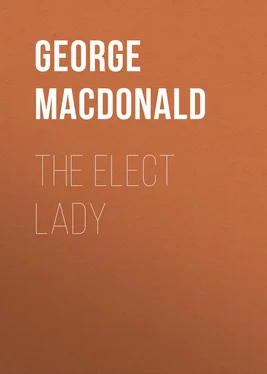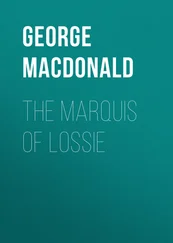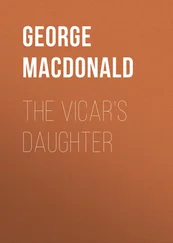George MacDonald - The Elect Lady
Здесь есть возможность читать онлайн «George MacDonald - The Elect Lady» — ознакомительный отрывок электронной книги совершенно бесплатно, а после прочтения отрывка купить полную версию. В некоторых случаях можно слушать аудио, скачать через торрент в формате fb2 и присутствует краткое содержание. Жанр: foreign_prose, foreign_religion, literature_19, foreign_antique, на английском языке. Описание произведения, (предисловие) а так же отзывы посетителей доступны на портале библиотеки ЛибКат.
- Название:The Elect Lady
- Автор:
- Жанр:
- Год:неизвестен
- ISBN:нет данных
- Рейтинг книги:5 / 5. Голосов: 1
-
Избранное:Добавить в избранное
- Отзывы:
-
Ваша оценка:
- 100
- 1
- 2
- 3
- 4
- 5
The Elect Lady: краткое содержание, описание и аннотация
Предлагаем к чтению аннотацию, описание, краткое содержание или предисловие (зависит от того, что написал сам автор книги «The Elect Lady»). Если вы не нашли необходимую информацию о книге — напишите в комментариях, мы постараемся отыскать её.
The Elect Lady — читать онлайн ознакомительный отрывок
Ниже представлен текст книги, разбитый по страницам. Система сохранения места последней прочитанной страницы, позволяет с удобством читать онлайн бесплатно книгу «The Elect Lady», без необходимости каждый раз заново искать на чём Вы остановились. Поставьте закладку, и сможете в любой момент перейти на страницу, на которой закончили чтение.
Интервал:
Закладка:
George MacDonald
The Elect Lady
THE ELECT LADY
CHAPTER I. LANDLORD’S DAUGHTER AND TENANT’S SON
In a kitchen of moderate size, flagged with slate, humble in its appointments, yet looking scarcely that of a farmhouse—for there were utensils about it indicating necessities more artificial than usually grow upon a farm—with the corner of a white deal table between them, sat two young people evidently different in rank, and meeting upon no level of friendship. The young woman held in her hand a paper, which seemed the subject of their conversation. She was about four- or five-and-twenty, well grown and not ungraceful, with dark hair, dark hazel eyes, and rather large, handsome features, full of intelligence, but a little hard, and not a little regnant—as such features must be, except after prolonged influence of a heart potent in self-subjugation. As to her social expression, it was a mingling of the gentlewoman of education, and the farmer’s daughter supreme over the household and its share in the labor of production.
As to the young man, it would have required a deeper-seeing eye than falls to the lot of most observers, not to take him for a weaker nature than the young woman; and the deference he showed her as the superior, would have enhanced the difficulty of a true judgment. He was tall and thin, but plainly in fine health; had a good forehead, and a clear hazel eye, not overlarge or prominent, but full of light; a firm mouth, with a curious smile; a sun-burned complexion; and a habit when perplexed of pinching his upper lip between his finger and thumb, which at the present moment he was unconsciously indulging. He was the son of a small farmer—in what part of Scotland is of little consequence—and his companion for the moment was the daughter of the laird.
“I have glanced over the poem,” said the lady, “and it seems to me quite up to the average of what you see in print.”
“Would that be reason for printing it, ma’am?” asked the man, with amused smile.
“It would be for the editor to determine,” she answered, not perceiving the hinted objection.
“You will remember, ma’am, that I never suggested—indeed I never thought of such a thing!”
“I do not forget. It was your mother who drew my attention to the verses.”
“I must speak to my mother!” he said, in a meditative way.
“You can not object to my seeing your work! She does not show it to everybody. It is most creditable to you, such an employment of your leisure.”
“The poem was never meant for any eyes but my own—except my brother’s.”
“What was the good of writing it, if no one was to see it?”
“The writing of it, ma’am.”
“For the exercise, you mean?”
“No; I hardly mean that.”
“I am afraid then I do not understand you.”
“Do you never write anything but what you publish?”
“Publish! I never publish! What made you think of such a thing?”
“That you know so much about it, ma’am.”
“I know people connected with the papers, and thought it might encourage you to see something in print. The newspapers publish so many poems now!”
“I wish it hadn’t been just that one my mother gave you!”
“Why?”
“For one thing, it is not finished—as you will see when you read it more carefully.”
“I did see a line I thought hardly rhythmical, but—”
“Excuse me, ma’am; the want of rhythm there was intentional.”
“I am sorry for that. Intention is the worst possible excuse for wrong! The accent should always be made to fall in the right place.”
“Beyond a doubt—but might not the right place alter with the sense?”
“Never. The rule is strict”
“Is there no danger of making the verse monotonous?”
“Not that I know.”
“I have an idea, ma’am, that our great poets owe much of their music to the liberties they take with the rhythm. They treat the rule as its masters, and break it when they see fit.”
“You must be wrong there! But in any case you must not presume to take the liberties of a great poet.”
“It is a poor reward for being a great poet to be allowed to take liberties. I should say that, doing their work to the best of their power, they were rewarded with the discovery of higher laws of verse. Every one must walk by the light given him. By the rules which others have laid down he may learn to walk; but once his heart is awake to truth, and his ear to measure, melody and harmony, he must walk by the light, and the music God gives him.”
“That is dangerous doctrine, Andrew!” said the lady, with a superior smile. “But,” she continued, “I will mark what faults I see, and point them out to you.”
“Thank you, ma’am, but please do not send the verses anywhere.”
“I will not, except I find them worthy. You need not be afraid. For my father’s sake I will have an eye to your reputation.”
“I am obliged to you, ma’am,” returned Andrew, but with his curious smile, hard to describe. It had in it a wonderful mixing of sweetness and humor, and a something that seemed to sit miles above his amusement. A heavenly smile it was, knowing too much to be angry. It had in it neither offense nor scorn. In respect of his poetry he was shy like a girl, but he showed no rejection of the patronage forced upon him by the lady.
He rose and stood a moment.
“Well, Andrew, what is it?”
“When will you allow me to call for the verses?”
“In the course of a week or so. By that time I shall have made up my mind. If in doubt, I shall ask my father.”
“I wouldn’t like the laird to think I spend my time on poetry.”
“You write poetry, Andrew! A man should not do what he would not have known.”
“That is true, ma’am; I only feared an erroneous conclusion.”
“I will take care of that. My father knows that you are a hard-working young man. There is not one of his farms in better order than yours. Were it otherwise, I should not be so interested in your poetry.”
Andrew wished her less interested in it. To have his verses read was like having a finger poked in his eye. He had not known that his mother looked at his papers. But he showed little sign of his annoyance, bade the lady good-morning, and left the kitchen.
Miss Fordyce followed him to the door, and stood for a moment looking out. In front of her was a paved court, surrounded with low buildings, between two of which was visible, at the distance of a mile or so, a railway line where it approached a viaduct. She heard the sound of a coming train, and who in a country place will not stand to see one pass!
CHAPTER II. AN ACCIDENT
While the two were talking, a long train, part carriages, part trucks, was rattling through a dreary country, where it could never have been were there not regions very different on both sides of it. For miles in any direction, nothing but humpy moorland was to be seen, a gathering of low hills, with now and then a higher one, its sides broken by occasional torrents, in poor likeness of a mountain. No smoke proclaimed the presence of human dwelling; but there were spots between the hills where the hand of man had helped the birth of a feeble fertility; and in front was a small but productive valley, on the edge of which stood the ancient house of Potlurg, with the heath behind it: over a narrow branch of this valley went the viaduct.
It was a slow train, with few passengers. Of these one was looking from his window with a vague, foolish sense of superiority, thinking what a forgotten, scarce created country it seemed. He was a well-dressed, good-looking fellow, with a keen but pale-gray eye, and a fine forehead, but a chin such as is held to indicate weakness. More than one, however, of the strongest women I have known, were defective in chin. The young man was in the only first-class carriage of the train, and alone in it. Dressed in a gray suit, he was a little too particular in the smaller points of his attire, and lacked in consequence something of the look of a gentleman. Every now and then he would take off his hard round hat, and pass a white left hand through his short-cut mousey hair, while his right caressed a far longer mustache, in which he seemed interested. A certain indescribable heaviness and lack of light characterized his pale face.
Читать дальшеИнтервал:
Закладка:
Похожие книги на «The Elect Lady»
Представляем Вашему вниманию похожие книги на «The Elect Lady» списком для выбора. Мы отобрали схожую по названию и смыслу литературу в надежде предоставить читателям больше вариантов отыскать новые, интересные, ещё непрочитанные произведения.
Обсуждение, отзывы о книге «The Elect Lady» и просто собственные мнения читателей. Оставьте ваши комментарии, напишите, что Вы думаете о произведении, его смысле или главных героях. Укажите что конкретно понравилось, а что нет, и почему Вы так считаете.












